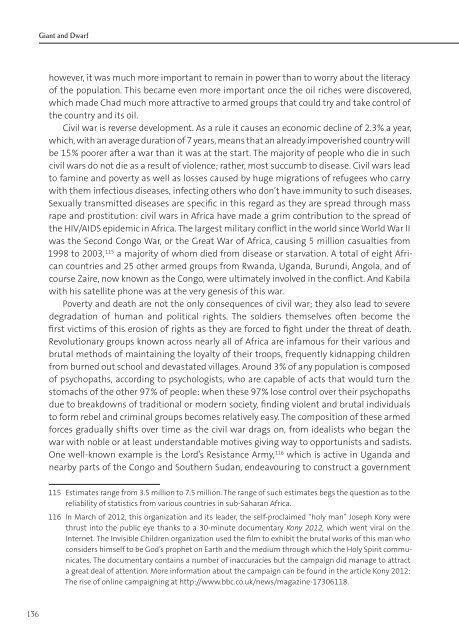Giant_and_Dwarf-FIN
Giant_and_Dwarf-FIN
Giant_and_Dwarf-FIN
You also want an ePaper? Increase the reach of your titles
YUMPU automatically turns print PDFs into web optimized ePapers that Google loves.
<strong>Giant</strong> <strong>and</strong> <strong>Dwarf</strong>however, it was much more important to remain in power than to worry about the literacyof the population. This became even more important once the oil riches were discovered,which made Chad much more attractive to armed groups that could try <strong>and</strong> take control ofthe country <strong>and</strong> its oil.Civil war is reverse development. As a rule it causes an economic decline of 2.3 % a year,which, with an average duration of 7 years, means that an already impoverished country willbe 15 % poorer after a war than it was at the start. The majority of people who die in suchcivil wars do not die as a result of violence; rather, most succumb to disease. Civil wars leadto famine <strong>and</strong> poverty as well as losses caused by huge migrations of refugees who carrywith them infectious diseases, infecting others who don’t have immunity to such diseases.Sexually transmitted diseases are specific in this regard as they are spread through massrape <strong>and</strong> prostitution: civil wars in Africa have made a grim contribution to the spread ofthe HIV/AIDS epidemic in Africa. The largest military conflict in the world since World War IIwas the Second Congo War, or the Great War of Africa, causing 5 million casualties from1998 to 2003, 115 a majority of whom died from disease or starvation. A total of eight Africancountries <strong>and</strong> 25 other armed groups from Rw<strong>and</strong>a, Ug<strong>and</strong>a, Burundi, Angola, <strong>and</strong> ofcourse Zaire, now known as the Congo, were ultimately involved in the conflict. And Kabilawith his satellite phone was at the very genesis of this war.Poverty <strong>and</strong> death are not the only consequences of civil war; they also lead to severedegradation of human <strong>and</strong> political rights. The soldiers themselves often become thefirst victims of this erosion of rights as they are forced to fight under the threat of death.Revolutionary groups known across nearly all of Africa are infamous for their various <strong>and</strong>brutal methods of maintaining the loyalty of their troops, frequently kidnapping childrenfrom burned out school <strong>and</strong> devastated villages. Around 3 % of any population is composedof psychopaths, according to psychologists, who are capable of acts that would turn thestomachs of the other 97 % of people: when these 97 % lose control over their psychopathsdue to breakdowns of traditional or modern society, finding violent <strong>and</strong> brutal individualsto form rebel <strong>and</strong> criminal groups becomes relatively easy. The composition of these armedforces gradually shifts over time as the civil war drags on, from idealists who began thewar with noble or at least underst<strong>and</strong>able motives giving way to opportunists <strong>and</strong> sadists.One well-known example is the Lord’s Resistance Army, 116 which is active in Ug<strong>and</strong>a <strong>and</strong>nearby parts of the Congo <strong>and</strong> Southern Sudan, endeavouring to construct a government115 Estimates range from 3.5 million to 7.5 million. The range of such estimates begs the question as to thereliability of statistics from various countries in sub-Saharan Africa.116 In March of 2012, this organization <strong>and</strong> its leader, the self-proclaimed “holy man” Joseph Kony werethrust into the public eye thanks to a 30-minute documentary Kony 2012, which went viral on theInternet. The Invisible Children organization used the film to exhibit the brutal works of this man whoconsiders himself to be God’s prophet on Earth <strong>and</strong> the medium through which the Holy Spirit communicates.The documentary contains a number of inaccuracies but the campaign did manage to attracta great deal of attention. More information about the campaign can be found in the article Kony 2012:The rise of online campaigning at http://www.bbc.co.uk/news/magazine-17306118.136


